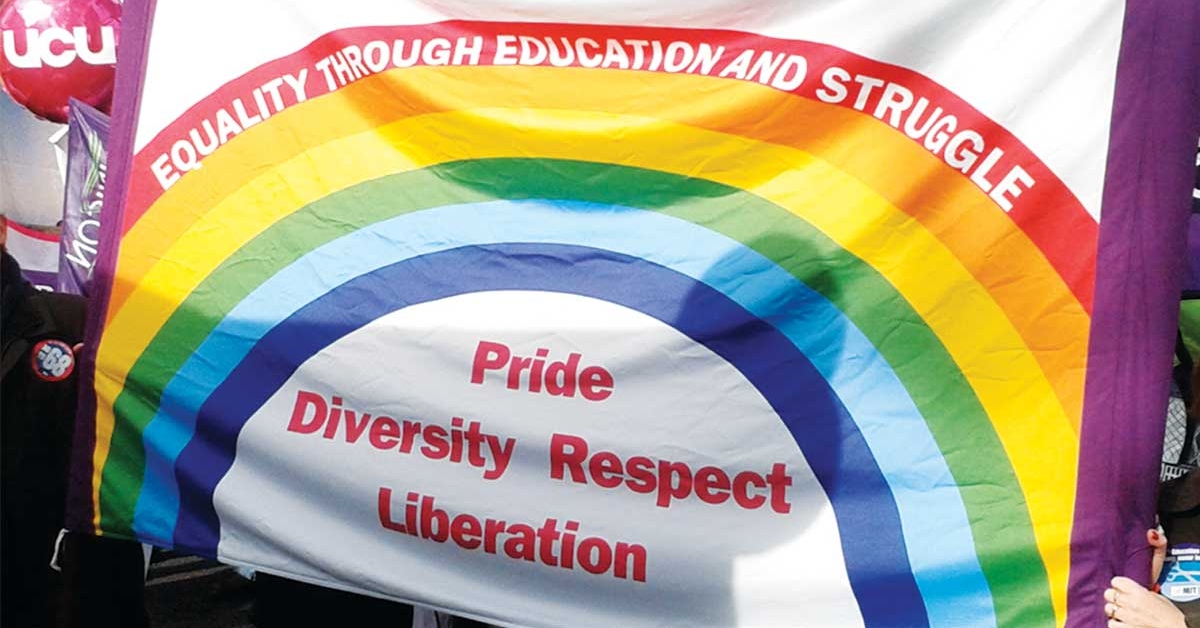
LGBT+ Liberation: LGBT+ lives and issues in the context of normativities - a UCU research conference
27 October 2022
Collection of papers drawn from presentations made at UCU's 6th LGBT+ research conference held in November 2021.
LGBT+ Liberation: LGBT+ lives and issues in the context of normativities
We are delighted to have brought together this collection of papers. The collection is drawn from presentations made at the 6th LGBT+ research conference which was held online on 2-4 November 2021.
The LGBT+ research conference is currently organised biennially to help foreground research about LGBT+ lives and issues. There has been concern about a lack of importance afforded to LGBT+ research in universities and programmes such as the research excellence framework (REF). These concerns have been addressed in several motions to UCU Congress that have subsequently become UCU policy.
Activist and academic researchers are invited to submit papers to the LGBT+ research conference which are then peer reviewed prior to invitations being sent for presentations. It is the conference itself, rather than individual papers, that is grounded in UCU policy, so there may be papers presented that do not directly relate to UCU policy. Similarly, as this collection arises from presentations to that conference it does not represent UCU policy but rather gives a picture of conference proceedings.
With thanks to the review and editorial team of this collection.
Bee Hughes
Katie Nicoll Baines
Jennie Appleyard
Seth Atkin
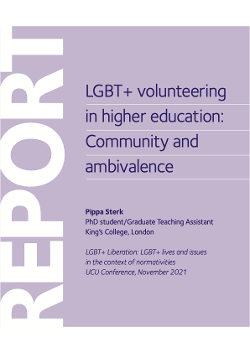 LGBT+ volunteering in higher education: Community and ambivalence
LGBT+ volunteering in higher education: Community and ambivalence
Pippa Sterk
PhD student/Graduate Teaching Assistant
King's College, London
![]() LGBT+ volunteering in higher education [145kb]
LGBT+ volunteering in higher education [145kb]
In this paper I report on my PhD research, where I investigate the ways in which LGBT+ volunteers within English Higher Education (e.g. students volunteering for LGBT+ societies and/or Students' Unions, or staff involved in their LGBT+ staff network) describe their aims, objectives, successes and obstacles in their volunteering work. I am particularly interested in whether and how volunteers make sense of their ambivalent position within and/or against institutional context, institutional image and institutional history. I am using a Discourse Analytical methodology to analyse interviews, focus groups, and university promotional material. This methodology allows me to collect qualitative data that allows LGBT+ volunteers to speak on these topics in their own words. This combination of data will give an insight into what is and is not conducive for LGBT+ working relations in Higher Education, and will allow me to formulate recommendations for how universities can act in ways that materially benefit LGBT+ students, rather than implementing cosmetic changes.
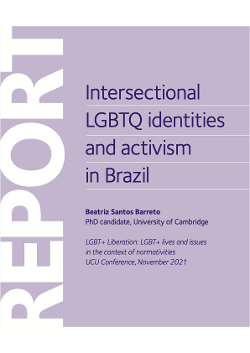 Intersectional LGBTQ identities and activism in Brazil
Intersectional LGBTQ identities and activism in Brazil
Beatriz Santos Barreto
PhD candidate, University of Cambridge
![]() Intersectional LGBTQ identities and activism in Brazil [156kb]
Intersectional LGBTQ identities and activism in Brazil [156kb]
In recent years, Brazilian LGBTQ movements have obtained rights typically considered the international standard of equality. However, queer people are still subjected to violence, intolerance, and a growing political opposition that led to the election of far-right President Jair Bolsonaro in 2018. In this paper, I discuss preliminary findings from 52 interviews conducted with Brazilian LGBTQ activists from January to September 2021. Throughout the interviews, I explored how intersections of gender, class, race, and religion inform my participants' views on and experiences with identity, activism, strategies, and futurities. Here I focus on race, class and Christianity to discuss intersectional demands, belonging in the LGBTQ community, conflicting identities, and the need for intersectional solidarity going forward.
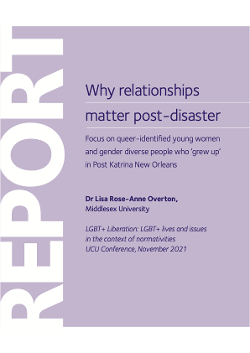 Why relationships matter post-disaster
Why relationships matter post-disaster
Focus on queer-identified young women and gender diverse people who 'grew up' in Post Katrina New Orleans
Dr Lisa Rose-Anne Overton
Middlesex University
![]() Why relationships matter post-disaster [114kb]
Why relationships matter post-disaster [114kb]
Little is known about the impact of disasters on queer people. Post-disaster research, even within the rich field of Gender and Disaster scholarship, has traditionally focused on adult, heterosexual women, usually with children (Bradshaw 2015; 2013). However, some research does discuss wider relationships such as women's relationships with other women (heteronormatively) (David 2017; Enarson 2000). This paper discusses the importance of relationships for queer-identified people post-disaster drawing on my own empirical research in Post-Hurricane Katrina New Orleans in 2012 where I did life history interviews with "young women" and "gender diverse" people who identified within a queer spectrum. Sexualities have been neglected in disaster research generally (Goldsmith, Raditz and Mendez 2021; Gaillard, Gorman-Murray and Fordham 2017; Overton 2014). Whilst this is changing and Disasters and Sexualities is growing as a sub-field, we still know very little about the wide range of relationships and how these are impacted post-disaster or how important they are in post-disaster recovery, particularly for queer women and gender diverse people. Relationships can be trickier to navigate for queer people, particularly family, and to a lesser extent, friendships, as well as the fact that queer relationships tend to be more invisibilised in popular culture. This paper demonstrates that post-disaster relationships are important to understand by examining how social spaces are a crucial provider of support for queer communities post-disaster; the importance of family and community relationships with sexual identity including the conflicts between family and sexuality such as worry and concern about family acceptance; finding likeminded people enabled a more positive outlook and contributed to a greater sense of assuredness around identity; physical distance from familiar surroundings became an important way to explore identities; and powerlessness for younger folks through lack of choice and lack of consultation. A particularly interesting finding from my research is linked to the post-disaster 'window of opportunity.' Whilst scholars have been sceptical of the so-called positive change that is said to come from a disaster, known as the post-disaster 'window of opportunity' (Byrne and Baden 1995), my research found that disaster through being an 'abnormal' time opened up new, yet temporary space to make big decisions, particularly around their sexualities that did not exist in times of 'normality.'
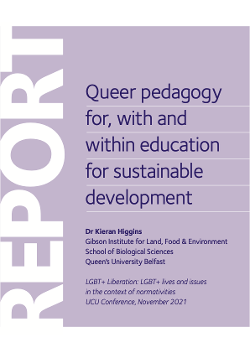 Queer pedagogy for, with and within education for sustainable development
Queer pedagogy for, with and within education for sustainable development
Dr Kieran Higgins
Gibson Institute for Land, Food & Environment School of Biological Sciences
Queen's University Belfast
![]() Queer pedagogy for, with and within education for sustainable development [198kb]
Queer pedagogy for, with and within education for sustainable development [198kb]
Education for Sustainable Development (ESD) is a growing movement that seeks to empower learners to face the existential threats of the Anthropocene. Queer pedagogy, as a form of critical pedagogy, rejects the influence of heteronormative and patriarchal systems and consequently also rejects anthropocentrism. To effectively educate for sustainable development, it becomes apparent that one must also educate in a queer-informed way. Despite this, there has been little scholarly work to date on where queer pedagogy fits within ESD. The purpose of this paper is to explore the link between the two seemingly related fields, but also provide a gateway for educational practitioners who come from the current paradigm within ESD to incorporate queer pedagogy, or for queer pedagogues to further a queered version of sustainable development, with a particular focus on higher education.
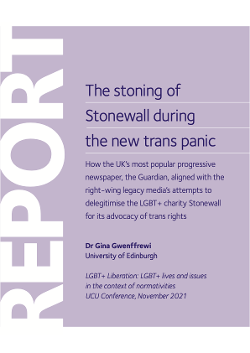 The stoning of Stonewall during the new trans panic
The stoning of Stonewall during the new trans panic
How the UK's most popular progressive newspaper, The Guardian, aligned with the right-wing legacy media's attempts to delegitimise the LGBT+ charity Stonewall for its advocacy of trans rights
Dr Gina Gwenffrewi
University of Edinburgh
![]() The stoning of Stonewall during the new trans panic [248kb]
The stoning of Stonewall during the new trans panic [248kb]
The explosion in the number of stories about trans issues since the late 2010s, published by a UK legacy media largely devoid of trans voices and related specialist knowledge, has seen coverage deemed "aggressive and damaging" against transgender people (IPSO, 2020: 12). Such trans testimonies, registering their distress at the negativity of the coverage by the UK legacy media, are supported by the findings of a number of international bodies such as the Council of Europe (2021) and ILGA-Europe (2021) which claim the UK's legacy media has been contributing to the demonization of the country's transgender community. One surprising participant in this media campaign has been the UK's most popular progressive news outlet the Guardian. While the reasons behind the apparent anti-trans tendency remain a point of conjecture, the evidence of transphobic framing is discernible and measurable. This article provides a frame analysis for some of the recurring patterns of delegitimization from the period of 2020-2022, specifically its coverage of the largest LGBT+ charity and trans-advocacy organization in the UK and Europe, Stonewall. As has been recognized (Trans Legal Project, 2021; Paton, 2021), Stonewall has increasingly become a collateral target of the U.K legacy media for its refusal to abandon its advocacy of trans rights. This study analyses how the Guardian's coverage has contributed to this attempted delegitimization of Stonewall, specifically in terms of its selection of key words and omission of key information in its coverage of the charity.
- PrintPrint this page
- Share


